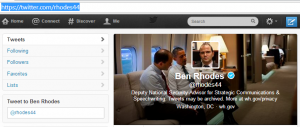PBS/CBS interviewer Charlie Rose has interviewed Syria’s leader, Bashir Assad, but I wonder if he took a message from the White House with his when he did his sit down interview. Why? Because he took along the Chairman of CBS News with him. It raised a question on Twitter:
took a message from the White House with his when he did his sit down interview. Why? Because he took along the Chairman of CBS News with him. It raised a question on Twitter:
No Title
I wonder if Bashar al-Assad knows that CBS News chief David Rhodes is the brother of @rhodes44? http://t.co/2iXn1FJLv8
And who’s @Rhodes44?
 From the New York Times blog on Syria:
From the New York Times blog on Syria:
“Charlie has been working on this for a long time,” said David Rhodes, the president of CBS News, who confirmed that Sunday’s interview “came through only this week.”
Mr. Rose drove to Damascus after flying into neighboring Lebanon. In a sign of the significance of the interview, he was accompanied by Jeff Fager, the chairman of CBS News and the top producer of “60 Minutes.”
“It’s not normal to send the chairman to produce an interview,” Mr. Rhodes said. “It’s also not normal to have an interview like this at a time like this.”
When you’re visiting a big ‘customer,’ sometimes you need to take the person from your company who has a high position to communicate the esteem in which you hold him. But if that’s what happened here, why didn’t the PBS chief go? The CBS Chairman went on the interview and CBS will receive only a snippet of the interview (that we know of so far) and PBS will get to play the entire interview.
Charlie Rose says he’s been trying for that interview for a very long time. So why did he get the interview now and why did the CBS Chief go with him? Did the White House pull strings or did Assad know of the connection and use the interview to send a message to the President and his Deputy National Security Adviser? As the American public resoundingly tell the President ‘NO!’ on a Syrian attack, one wonders if Assad himself can persuade the President to call off any strikes.
And while it could pay dividends here, this case points up the concern about the cozy and insular relationships between the people who walk the halls of power and the people who are supposed to objectively cover them.



